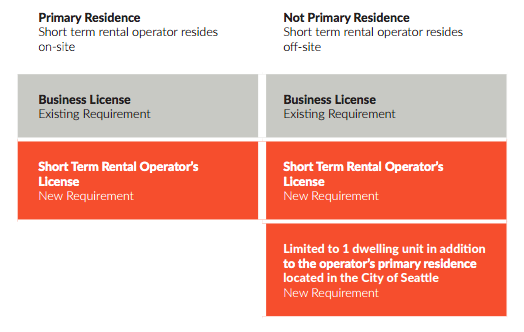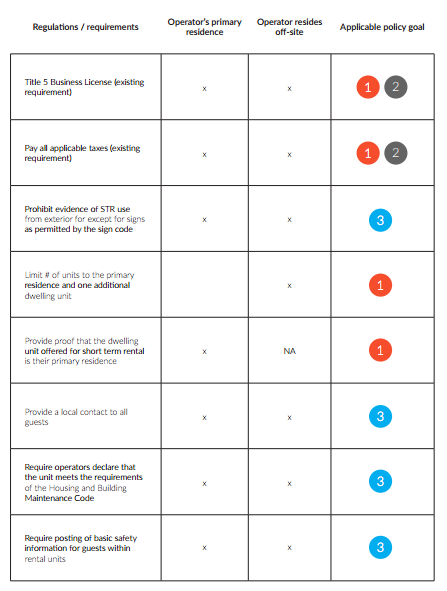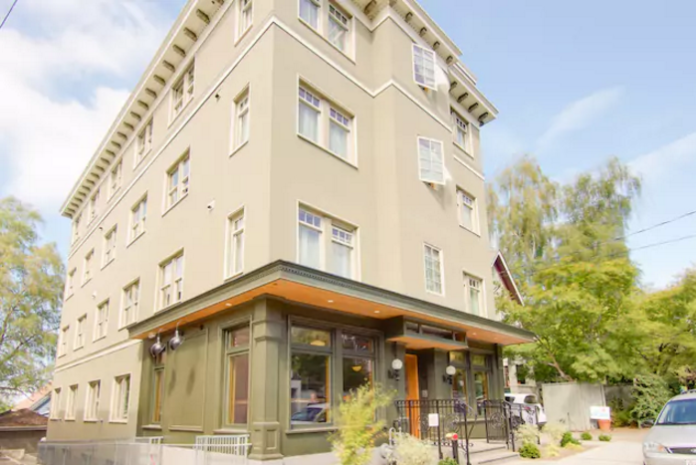Councilmember Tim Burgess is resurrecting legislation that would regulate short-term vacation rentals in Seattle. The primary goal of the legislation is to address the housing affordability impacts that short-term vacation rental services like Airbnb and VRBO can have on neighborhoods, particularly by large-scale commercial operators. Other goals of the legislation are to ensure health and safety, payment of appropriate business taxes, and creating fairness in the short-term vacation rental market. Last year, similar legislation was taken through the committee review process but met stiff opposition from homeowners who wanted fewer or no regulations on short-term vacation rentals.
The revised legislation would require all short-term vacation rental operators to hold a license, but would eliminate the maximum number of days that a unit could be rented as a short-term vacation rental. The proposed legislation would also grandfather in some large-scale commercial short-term vacation rental businesses–which in some cases are effectively hotels–and cap the number of units that individual operators could run.

Recent data procured by the Seattle Department of Construction and Inspections provides important context on the issue of regulating short-term vacation rentals:
According to data obtained from Airbnb in January 2017, over 3,900 persons or entities (“hosts”) in the City of Seattle rent all or part of a housing unit through Airbnb. Of the approximately 5,700 rental units 2 available for short-term rental, over 4,000 rentals are for entire homes or apartments and at least 1,000 are not the primary residence of the owner.
For small short-term vacation rental operators, many are using platforms like Airbnb to make additional money to pay for their increasing housing costs–often while they themselves go on vacation. But regulating short-term vacation rentals has become a growing priority as property owners have converted permanent housing units into full-time short-term vacation rentals. Inaction on regulation has led to hundreds and possibly thousands of permanent long-term housing units to be lost in Seattle–many of which were previously affordable or moderately-priced housing units. By most indications, short-term vacation rentals have exacerbated the overall housing shortage and affordability crisis in booming cities like Seattle.
Summary of Proposed Regulations
The proposed regulations would diverge from last year’s version of the legislation in number of ways, but the most key difference is that it doesn’t place a cap on the number of nights a unit can be rented as a short-term vacation rental. Instead, places general caps on the number of units that an operator may own and run as short-term vacation rentals. In sum, the proposed legislation would:
- Add a new section to the Land Use Code (Title 23 SMC) related to “short-term rentals” and provide specific development standards;
- Add a new chapter to the Licensing Code (Title 6 SMC) related to “short-term rentals” and establish requirements for short-term rental operator’s and platform licenses and appeal and enforcement processes for non-compliance with the licensing requirements;
- Modify the development standards for “bed of breakfast” under the Land Use Code; and
- Authorize a one-year compliance period for property owners already offering short-term vacation rentals.
General Short-Term Vacation Rental Regulations

The following table outlines the general regulations for short-term vacation rentals:
| Standard | Requirement |
|---|---|
| Short-Term Vacation Rental | Defined as a lodging use that is neither a hotel nor motel in which a dwelling unit or portion thereof is provided to guests to stay for a fee fewer than 30 consecutive nights. |
| Short-Term Vacation Rental Operator | Defined as any person who is the owner or tenant of a dwelling unit, or portion thereof who provides a dwelling unit, or portion thereof, for short-term rental use. |
| Maximum Number of Units | Generally, each operator is limited to two dwelling units to run short-term vacation rentals (one at their primary residence in Seattle and one at another property elsewhere in the city), except that: A homeowner may consider both their primary residence and one accessory dwelling unit on the same lot as the primary residence for the purposes of licensing; and An operator who operates short-term vacation rentals in the Downtown, Uptown, and/or South Lake Union Urban Centers may operate a short-term vacation rental at: the operator's primary residence; in any dwelling units in the Downtown, Uptown, and/or South Lake Union Urban Centers that were in operation prior to the effective date of the proposed ordinance; and no more than one additional dwelling unit located outside of the Downtown, Uptown, and South Lake Union Urban Centers. To qualify, the operator must have business license tax certificate, records showing proper tax collection during the 12 month prior to the effective date of the proposed ordinance, and a registry of the dwelling unit(s) operating within 12 months prior to the effective date of the proposed ordinance. |
| Maximum Number of Residents and Guests | Eight or fewer related and non-related persons per dwelling unit, except in the case of accessory dwelling units when the combined maximum between the primary dwelling unit and accessory dwelling unit is eight related and unrelated persons. |
| Maximum Number of Nights | There is no maximum number of nights that an operator may rent a short-term vacation rental space. |
| Location | A short-term vacation rental may be located in a dwelling unit or accessory dwelling unit. |
| Signage | Signage to identify the short-term vacation rental business must comply with the sign code (Chapter 23.55 SMC). |
| Food and Snack | Any operator providing breakfast, light snacks, or both to guests must meet public health codes Seattle-King County Public Health and Washington State Department of Health. |
| Licensing | Short-term vacation rental operators must obtain a business license tax certificate and operator's license. |
| Delay Compliance | Any short-term vacation rental in operation prior to the adoption date of the proposed ordinance will have one year to come into compliance with all regulatory requirements. |
Licensing Requirements for Individual Operators

All individual operators of a short-term vacation rental would be required to obtain a license and meet the following requirements:
- Hold liability insurance of at least $1 million for the short-term vacation rental use (either independently or through the short-term vacation rental platform);
- Provide a local contact for guests to contact (the contact must be reachable during the whole stay of a guest);
- Install smoke detectors and carbon monoxide alarms in each bedroom and every floor and have operable and charged fire extinguisher;
- Comply with the Housing and Building Maintenance Code; and
- Pay all applicable taxes for each transaction (either independently or through the short-term vacation rental platform).
Operators would also be required to post the following information in each dwelling unit:
- Emergency contact information;
- Local contact information for the short-term vacation rental operator or designated agent;
- Street address;
- Floor plan of fire exits and escape routes;
- Contract information for the City of Seattle Customer Service Bureau to report complaints and concerns; and
- Maximum occupancy limits.
All operator licenses would only be valid for one year from issuance and require annual renewal to maintain the business. The fee that operators would pay for an annual license would initially be between $50 and $100 (to be determined), but could be adjusted administratively in the future.
Licensing Requirements for Platforms
The platforms (e.g., Airbnb and VRBO) through which operators run their short-term vacation rentals would also be required to obtain a license. The proposed regulations would require the short-term vacation rental platforms to:
- Report quarterly to the City the total number of short-term vacation rentals operated through their platform in the city that were active and the number of nights each listing was rented during that quarter;
- Advise their operators that they must collect and remit applicable taxes to local, state, and federal government unless the platform does this on the operators’ behalf;
- Provide a summary of all applicable regulations to operators whenever they updated by the City; and
- Only allow individual operators to list their spaces through the platform if they have a valid operator license.
Like operators, licenses would only be valid for one year from issuance and require annual renewal to maintain the business. The total fee for the licenses would initially be between $2 and $7 (to be determined) per night of bookings may through the platform, but could be adjusted administrative in the future.
Locking Bed and Breakfasts In Amber
While the bulk of the legislation is primarily concerned with short-term vacation rentals, parallel code amendments are being proposed to bed and breakfast uses. New bed and breakfast uses would, as proposed, be prohibited, which would essentially retain existing ones as grandfathered uses and force proposed new bed and breakfast uses to conform to the short-term vacation rental regulations.
Next Steps
The draft legislation is open for public comment as part of the State Environment Policy Act (SEPA) process. Comments on the proposal can be submitted to Christina Ghan through May 8th. Appeals of the proposal are also accept through the same comment period. Eventually, the proposal should head to the City Council for review and possible adoption.
Related Article
Stephen is a professional urban planner in Puget Sound with a passion for sustainable, livable, and diverse cities. He is especially interested in how policies, regulations, and programs can promote positive outcomes for communities. With stints in great cities like Bellingham and Cork, Stephen currently lives in Seattle. He primarily covers land use and transportation issues and has been with The Urbanist since 2014.


